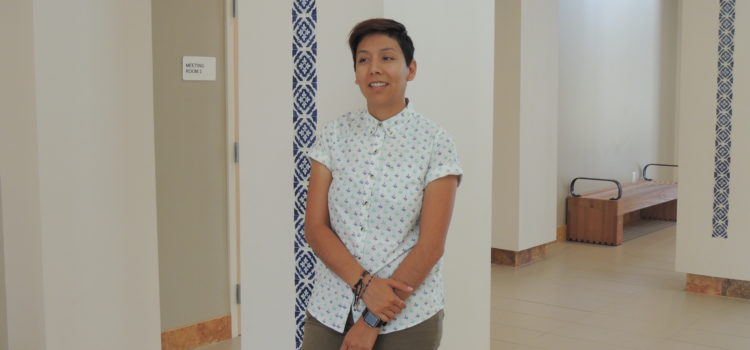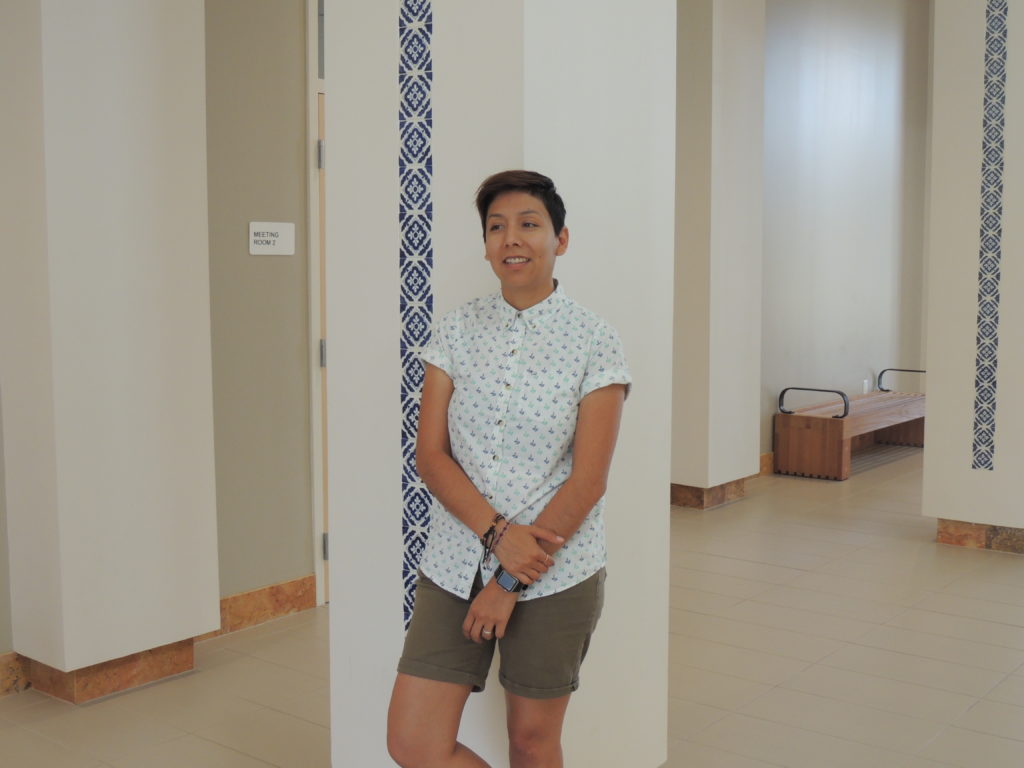
By Fatima Ramirez / Coachella Unincorporated
Author’s Note: Alexis Ortega is challenging what it means to be a Latina by being her most authentic self. Alexis is the Director of Community Engagement at the LGBT Center of The Desert in Palm Springs. Coachella Uninc. youth reporter, Fatima Ramirez sat down to talk with Alexis about what it was like growing up in Palm Springs, being Queer and Latina and to find out what Alexis’ hopes are for the future of her community. This is the first of a three part series highlighting the diversity and intersectionality of the Latina experience in the Eastern Coachella Valley.
FR: Thank you for sitting down with me to have this conversation about identify and growing up in the Coachella Valley. Do you identify as a Latina?
AO: I do and I think it’s taken me some time to reconcile my different parts of my identity. I’ve had difficulty with that because of my LGBTQ identity. Now that I’m 32, I regret that [difficulty] because it’s like these dominant forces were telling me I needed to be like [them]. I feel like I missed out on a lot because of those complicated feelings growing up being a young person.
Now I fully claim my identity as Latina because to folks that’s what I look like to them right? But that is what I am, so I’m not going to deny that. I’m proud of that. Today I’m at the point where I am Latina. Yes, maybe I can’t speak Spanish perfectly and maybe my accent, when I’m speaking Spanish, is horrible and maybe there are things about my culture that I haven’t yet grasped or learned, but that doesn’t preclude me from claiming that as my identity.
FR: Sometimes the label Latina can have a negative associations or assumptions. Can you tell me about the most irritating assumption someone has made about you?
AO: The most irritating assumption made about me is that Latinas are super high femme. I was always a tomboy growing and my dad loved it because I’m the oldest. I’m the first kid. I’m not a boy but Im a tomboy. I’ll go outside and I’ll throw a football around with him and pass the ball around with him and play soccer, so he was really into that. None of my cousins were like that, they were all preoccupied with boys or with makeup. I never really knew what it was like to be a Latina who wasn’t super high femme.
FR: But being a Latina can sometimes still have a hugely positive effect. Is there an event or memory you have where you felt empowered by that definition?
AO: I think the first time where I felt empowered, and not like this internalized shame, was probably the moment when I learned my community’s history. First, that started in a really specialized way like with Queer Chicanx or Queer Latina stories that I finally felt reflected in. The first one that I had ever learned about was Cherrie Moraga who had a similar story in terms of not really connecting with her Chicana roots. It wasn’t until later that she claimed her identity. That was one of the first times when I learned about our resiliency as a community and our community outside a heteronormative framework. All of that happened in college and what a shame that it couldn’t have happened five years earlier or ten years earlier. I think about that a lot.
FR: Since you identify as queer and you work with LGBTQ comunity do you feel your identity as Latina affects your work?
AO: Definitely, because my identity is at the intersection of other identities, not just Latina, not just queer. Also my gender expression. These are all perspectives that I bring to my work which is centered on my queer identity that if I didn’t have those perspectives, they wouldn’t inform my work. I would be singularly focused on the LGBTQ experience identity and it wouldn’t be informed by how these other different identities layer on top of that and intersect with that. It absolutely affects my work because I’m constantly being mindful of what does it mean to be LGBTQ? Who’s defining that? Where are the visible LGBTQ spaces and where are the folks who are not in those spaces, which are predominantly mainstream predominantly white predominantly men, at least here locally. How do we shake that up?
FR: How do you embrace being a queer latina while living in the predominantly white community of Palm Springs?
AO: It can be a little bit isolating but one of the ways I manage that is by just constantly seeking out folks who have shared experiences, shared identities and shared values. That’s one of the reasons I’m super passionate about the work that I do today [in the Eastern Coachella Valley (ECV)]. Yes, I work for the LGBT Center, whose building is in Palm Springs, and I live in Palm Springs but my work is constantly centered and focused on what’s happening out here [in the ECV]. So having the opportunity to connect with people, whether or not they’re LGBTQ, but who are racially and economically diverse is a way I connect with people on an individual level and doing a lot of listening.
FR: Can you tell me a little bit about what it was like growing up in Palm Springs?
AO: I have a lot of love for where I live. It’s a very different experience growing up there Latino versus being in a community like Mecca or Coachella, where you’re constantly surrounded by affirmations of your culture, history, your appearance and your language. Those are the things that I wasn’t fortunate enough to grow up with. I had a lot of shame and a lot of confusion about what spaces were for me. Its stuff I’m still dealing with today. Who am I? What communities am I a part of? What spaces are made for me?
FR: For the past two years, the Women’s March has been organized in Palm Springs. Do you feel represented in those kinds of feminist spaces?
AO: I guess it depends. For instance, spaces like the Women’s March, especially the one in Palm Springs, is super overwhelmingly white. But I do feel connected to the speakers and the attendees who are there, who aren’t part of that majority. I feel like the feminist spaces that I might be drawn to are usually lead by women of color. For me it’s not only the white aspect it’s also about the heteronormative aspect. Like how straight is this space? Which is ok, but for me I need more.
FR: What are your hopes for a future generation? What positive changes do you see happening?
AO: I do feel like there’s a change happening. As a community, as a Latino community, we’ve been heavily affected and impacted by colonization that has been a central component of what it means to be Latina. Like religion, or like certain gender roles, those things aren’t necessarily rooted in the people who existed before this period of colonization. So what I would like to see in the future is a continual exploration of the systems that we partake in and looking at that with a critical lense. Do those systems still serve us? If they don’t, what do we create anew or what do we go back to? For sure I see that happening now with folks who are elevating or uplifting Indigenous words for people whose gender identity is kind of fluid.
